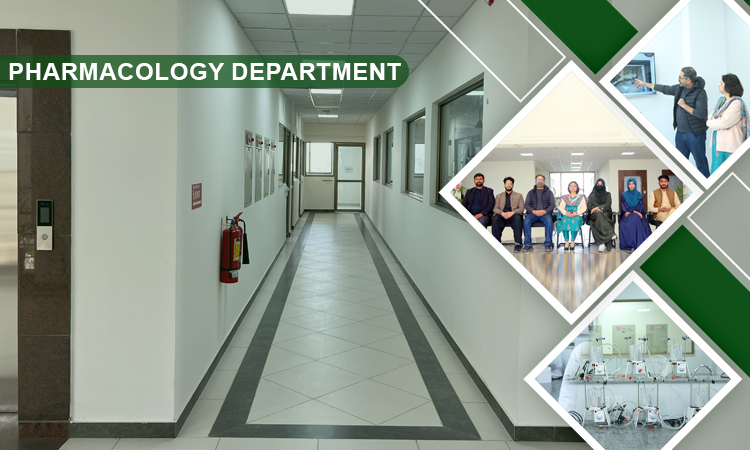Pharmacology Department

The Pharmacology Department (headed by Prof. Dr. Muniza Qayyum), is a vital division of Queens Medical College, dedicated to the study of the effects of drug on the human body and vice versa. The Pharmacology department facilitates students to understand subject with clinical significance involving the study of dynamics, kinetics,
therapeutics, adverse effect, contraindications, possible drug interactions and pharmacy.
Key Features of the Pharmacology Department:
1. Teaching and Education:
Provides foundational knowledge in Pharmacology to medical students.Covers key systems such as general pharmacology, autonomic nervous system, cardiovascular, respiratory, nervous, endocrine, renal, chemotherapy and musculoskeletal systems.
2. Research:
Conducts cutting-edge research on study of the effects of drug on the human body and vice versa, mechanism of action and therapeutics3. Laboratory Facilities:
Equipped with advanced tools for experimental and clinical pharmacology studies.4. Clinical Relevance:
Collaborates with clinical departments to apply pharmacological principles in patient care and treatment.Focuses on translational research to improve treatment and prescription.
Faclities
- The pharmacology departmental structure is defined. (Department organogram and staff structure)
- The head of department is aware of his/her responsibilities.
- The head of department is aware of current departmental challenges.
- There is a structured timetable of various classes. (Small group discussions, Lab Practicals, tutorials etc.)
- There is a structured allocation of faculty to cover the student schedules.
- There is structured duty roster of staff including lab technicians to provide technical and clerical support.
- The lab is well equipped to cater to needs of the students.
- The lab is well equipped for all practicals related to formulation, compounding, labeling and dispensing of drugs.
- The lab is well equipped for experimental studies on animals to evaluate drug kinetics and dynamics.
- The students are comfortable with the study environment.
- The Students feel adequacy of resources in the pharmacology lab, and tutorial rooms etc.
- The Students feel adequacy of resources in library.
- Mentoring sessions are organized for students to provide guidance on their academics as well as other concerns, such as hostel-related issues, time management, stress management, career planning, and welfare counseling.
- Facilities are provided for students to conduct research, and they receive guidance on completing various research projects and publishing articles.

Objectives
The study of pharmacology focuses on the interactions between drugs and living organisms, with an emphasis on the mechanisms of action, therapeutic applications, and potential side effects of medications. The primary objectives of the department are as follows:
Understand Drug Actions
Explore how drugs affect various biological systems (e.g., cardiovascular, nervous, endocrine, and immune systems).Study the pharmacodynamics (drug actions and mechanisms) and pharmacokinetics (absorption, distribution, metabolism, and excretion) of medications.
Learn Rational Prescribing Practices
Equip graduates with the knowledge to select appropriate drugs based on efficacy, safety, patient characteristics, and evidence-based guidelines.Emphasize the importance of dosage regimens, drug interactions, and monitoring therapy.
Support Medical Practice
Provide foundational knowledge for understanding the pharmacological basis of disease treatment and prevention.Train graduates to evaluate the benefits and risks of various pharmacological therapies in clinical settings.
Explore Drug Development and Research
Introduce students to the process of drug discovery, development, and clinical trials.Highlight the importance of evidence-based medicine and critical appraisal of new drugs and therapies.
Understand Adverse Drug Reactions and Toxicology
Study the mechanisms and management of adverse drug reactions (ADRs) and drug toxicities.Prepare graduates to recognize, report, and manage medication errors and side effects.
Develop Insights into Pharmacogenetics and Individualized Therapy
Explore the influence of genetic factors on drug response and metabolism.Encourage the use of personalized medicine to optimize therapeutic outcomes.
Promote Public Health and Rational Drug Use
Train graduates to advocate for the rational use of drugs to minimize antimicrobial resistance, misuse, and overprescription.Teach the principles of essential medicines and cost-effective therapy.
Understand Disease Pharmacology
Study how pharmacological interventions can alter disease progression and improve outcomes.Relate the underlying pathophysiological mechanisms to the selection and efficacy of therapeutic agents.
By achieving these objectives, the department aims to equip medical graduates with a thorough understanding of pharmacology, empowering them to make informed decisions in clinical practice and contribute to advancing medical science.
Faculty List Pharmacology
 Prof. Dr. Muniza Qayyum
Prof. Dr. Muniza Qayyum
- Department: Pharmacology
- Designation: Professor & HOD
- Qualification: MBBS, MPhil
 Prof. Dr. Fouzia Parveen
Prof. Dr. Fouzia Parveen
- Department: Pharmacology
- Designation: Associate Professor
- Qualification: MBBS,MPhil
 Dr. Waleed Arshad
Dr. Waleed Arshad
- Department: Pharmacology
- Designation: Assistant Professor
- Qualification: MBBS, MPhil

